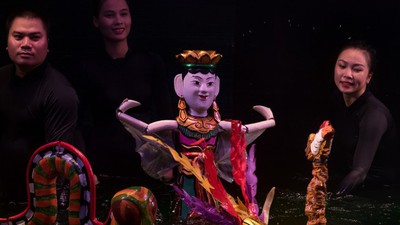 |
| Artist and former director of Thang Long Water Puppet Theatre Chu Luong. Photo toquoc.vn |
Your water puppets are on display at your home. Why did you choose this type of art?
My whole life has been attached to puppetry. I am also heavily influenced by my father, painter Chu Manh Chan. He is passionate about the pure beauty of Vietnamese old rural village and people.
That beauty is associated with the art of water puppetry which comes from the life of peasants.
My father paints large-size lacquer works to record old beauty scenes that have been forgotten. He wants to keep the beauty alive of the rural areas.
I make puppets to depict the beauty of the peasants. The museum is simply a place in my homeland in La Khe Ward in Ha Dong District displaying our works which we devote our life to.
It is a destination for our friends to come to enjoy and recall the old things.
Could you talk about the process of making a puppet?
I have involved in water puppetry for 40 years and still my passion for this art is very strong. I have travelled to different locations in the whole country to meet puppetry artisans to learn their stories.
I have also researched documents about puppetry and have learned about core value of this unique craft. I was born and grew up in the Red River Delta village. So agricultural daily life and spirit was so deeply embedded in my mind. This helps me to make the puppets with the typical cultural characteristics of the Red River Delta.
My family also has a tradition of making lacquerware. I make good use of the traditional lacquer technique to make the water puppets. I have made water puppets for many shows and exhibitions.
How important is the preservation of puppetry?
Every time I talk about it I feel sad because the pure beauty is fading away.
In the past, puppet shows were held to entertain people once a difficult harvest season had finished.
We are trying to restore authentic water puppetry but the way we do may not be reasonable. I remember a project on the water puppetry restoration in the northern villages. It was funded by Ford Foundation many years ago.
However, the restoration process was carried out without accuracy. Each water puppet village has its own characteristics about story, music and dialogue. Under the project, the puppets were made by a group of workers and given to the water puppet villages.
What is the most important thing in the water puppetry preservation?
I used to be a manager of Thang Long Water Puppet Theatre and I know that it is the most important to spread the love of puppetry to every artist and manager as well.
Plus, the artist and the manager should know about the value of this genre.
I spend time studying water puppetry even after I retired. I have three research papers on water puppetry which were published. They are Vẻ Đẹp Tạo Hình Rối Nước Việt Nam (The Beauty of Vietnamese Water Puppetry), Rối Nước Việt Nam với Thiếu Nhi (Vietnamese Water Puppetry with Children), and Văn Hoá Truyền Thống Kết Tinh Trong Nghệ Thuật Rối Nước (Vietnamese Traditional Culture in Water Puppetry).
I also restore the old water puppetry repertoires and I have exhibitions at home and abroad to honour the unique Vietnamese water puppetry.
Source: Vietnam News

Puppeteers breathe new life into puppetry art
Thang Long Water Puppet Theater in the center of the capital city is one of the most popular attractions in Hanoi.